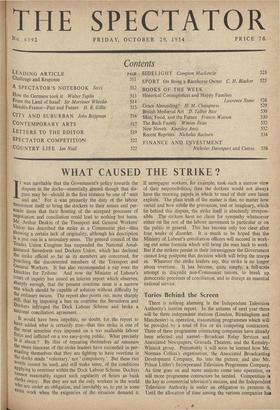WHAT CAUSED THE STRIKE ?
iT was inevitable that the Government's policy towards the dispute in the docks—essentially absurd though that dis- pute may be—should in the first instance be one of ' wait and see.' For it was primarily the duty of the labour Movement itself to bring the dockers to their senses and per- suade them that their flouting of the accepted processes of negotiation and conciliation could lead to nothing but harm. Mr. Arthur Deakin of the Transport and General Workers' Union has described the strike as a Communist plot—thtis showing a certain lack of originality, although his description is a just one in a secondary sense. The general council of the Trades Union Congress has suspended the National Amal- gamated Stevedores and Dockers ,Union, which has declared the strike official so far as its members are concerned, for Poaching the discontented members of the Transport and General Workers. It has also recommended a rap over the knuckles for Tribune. And now the Minister of Labour's court of inquiry has issued an interim report which observes. Sharply enough, that the present overtime issue is a narrow one which should be capable of solution without difficulty by the ordinary means. The report also points out, more sharply still, that by imposing a ban on overtime the Stevedores and Dockers infringed the Dock Labour Scheme and broke a national conciliation agreement.
It would have been impolitic, no doubt, for the report to the added what is certainly true—that this strike is one of lute most senseless ever imposed on a too malleable labour force and inflicted on a too easy-going public. What precisely is it about ? By dint of repeating themselves ad nauseam the more innocent of the strike leaders have succeeded in per- suading themselves that they are fighting to have overtime in the docks made ' voluntary,' not ' compulsory.' But these two Words cannot be used, and still make sense, of the 'conditions applying to overtime within the Dock Labour Scheme. Dockers cannot reasonably expect such regularity of hours as bank clerks enjoy. But they are not the only workers in the world Who are under an obligation. and inevitably so, to put in some extra work when the exigencies of the situation demand it. If newspaper workers, for example, took such a narrow view of their responsibilities; then the dockers would not always have the morning papers in which to read of their own latest exploits. The plain truth of the matter is that, no matter how varied and how subtle the grievances, real or imaginary, which lie behind this dispute, the strike itself is absolutely irrespon- sible. The strikers have no claim for sympathy whatsoever either on the rest of the labour movement in particular or on the public in general. This has become only too clear after four weeks of disorder. It is much to be hoped that the Ministry of Labour's conciliation officers will succeed in work- ing out some formula which will bring the men back to work. But if the strikers persist in their intransigence the Government cannot long postpone that decision which will bring the troops in. Whatever the strike leaders say, this strike is no longer about 'overtime. It has become, quite simply, a full-scale attempt to discredit non-Communist unions, to break up democratic processes of conciliation, and to disrupt an essential national service.


































 Previous page
Previous page